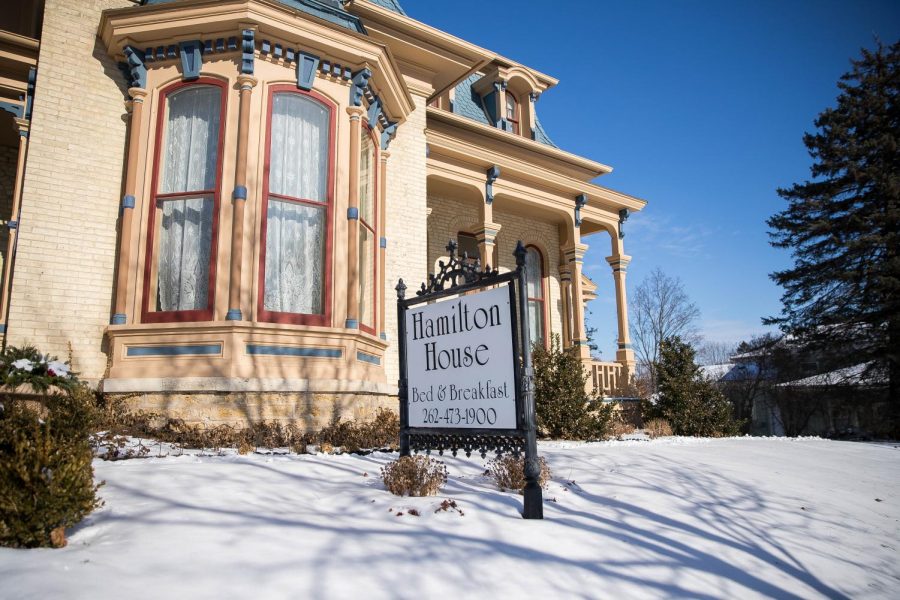Council Denies Main Street Property Rezone Request
The City of Whitewater denied a request to rezone the property that the 1868 Hamilton House resides on last Tuesday night. Following the guidance of the Plan Commission and Christine Munz-Pritchard, who recommended the Council deny the rezone application, the Council unanimously voted to keep the property zoned as Planned Development instead of R-3. The sale of the home was contingent on the approval of the rezone application.
January 23, 2018
Citing parking limitations and “not fitting into the neighborhood” were among the reasons the City of Whitewater Common Council unanimously denied a motion to rezone the Hamilton House Bed and Breakfast, 328 W. Main St., during their Jan. 16 meeting.
James and Lori Heckendorf, University of Wisconsin-Whitewater alumni who live in Geneva, Illinois, had accepted a bid to purchase the two story Victorian-style Hamilton House from its current owners Lawrence and Cheryl Witham of FW Properties, LLC.
The finalization of their purchase, however, rested on a successful rezoning from its current zoning classification as Planned Development to R-3 property with a conditional request, which would have allowed the home to be occupied by 18 Honors students from UW-Whitewater.
The Withams are looking to sell the property because of a “change in the economic climate” for bed and breakfasts, a letter to the city read. They specifically cited the popularity of short-term lodging services such as Airbnb as their reason for not wanting to sell the property as a bed and breakfast.
The rezoning request was made due to the Heckendorfs’ wanting to create a “quiet, studious, academic environment,” according to the application submitted to the Planning Commission, which was reviewed and given a public hearing at the Commission’s Jan. 8 meeting.
In a letter to the city, the Heckendorfs’ wrote that upon the purchase of the building, it would have been renamed the “Hamilton House of Honors.”
“Neighboring uses are similar uses, except that this property is intended to house academically accomplished students, or honors students, in the way that the University of Virginia provides for honors students,” the submitted application read.
If it had been approved, the R-3 rezone would have made the Hamilton House a multi-family residence, which allows for five unrelated residents per property to occupy the building.
The rezone request included a companion conditional request that was necessary to house up to 18 students to occupy the residence at a time.
In addition to the 18 students, it was also proposed that up to two resident assistants could also occupy the residence, raising the maximum number of residents to 20.
Any changes to the intended use of the Hamilton House would have had to been approved by the Landmarks Commission, as the building, built in 1868, is a part of the Main Street Historic District and the Register of Historic Places.
Two tunnels underneath the home have also been found, leading to speculation that it was once a stop on the Underground Railroad, a means of transportation for Southern slaves escape their owners to freedom in the North, according to a 2013 Landmarks Commission brochure.
In agreement with the unanimous City of Whitewater Plan Commission decision, city planner Christine Munz-Pritchard issued a memorandum to the Council that recommended the property not be granted their rezoning request.
“It’s kind of a weird one, because we didn’t approve their conditional use, and I was kind of under the impression that if they could only stick five people in it, it wouldn’t be economically feasible,” Munz-Pritchard said at the Jan. 16 Council meeting.
In this memorandum she voiced strong opposition to the rezoning request, citing no justification for the quantity of students living in the residence without building regulations, certifications and licenses that other group homes in Whitewater such as sororities, fraternities or adult group homes must comply with under state law.
The Hamilton House also just isn’t big enough for 18 people, Munz-Pritchard wrote in the memorandum.
“Due to the fact we have NEVER approved 18 unrelated without it being tied to a state regulated program I’m going to use the R-2A formula for unrelated and square footage. At 18 unrelated [people] it would require a minimum of 6,350 square feet of habitable space,” she wrote. “According to the application information, it is estimated at 5,726 sq ft.”
With a minimum requirement of nine parking stalls and a preference of at least 15, limitations on available parking space also prompted concerns from Munz-Pritchard. In the rezoning application the Heckendorfs submitted, they wrote that “adequate parking” exists on the property, and if needed, a student would be referred to the city to purchase a municipal parking parking permit.
“With the close proximity to campus, not all students will want a car in Whitewater,” the Heckendorfs’ application reads.
In addition, there was no plan to enforce that the residents would be Honors students as they are regulated by UW-W, the application and the real-estate layouts conflicted in the number of bedrooms the home has and an 18-person home would not fit in with the surrounding neighbors, all of which is housing that is limited to either single-family or duplexes with a maximum occupation of three unrelated people, she wrote in the memorandum.
As a point of discussion before the Council voted, Ald. Chris Grady (Dist. 3) said the Council would be “opening an incredible can of worms” if they approved the rezoning request.
“By approving it as an R-3, it could no longer be a bed and breakfast, so you’d be eliminating the current business that’s in there, and there is not enough parking there for them to get the 11 people, which they said was the minimum they need to rezone it,” Grady said. “It makes no sense either way. We have no choice but to reject it.”













